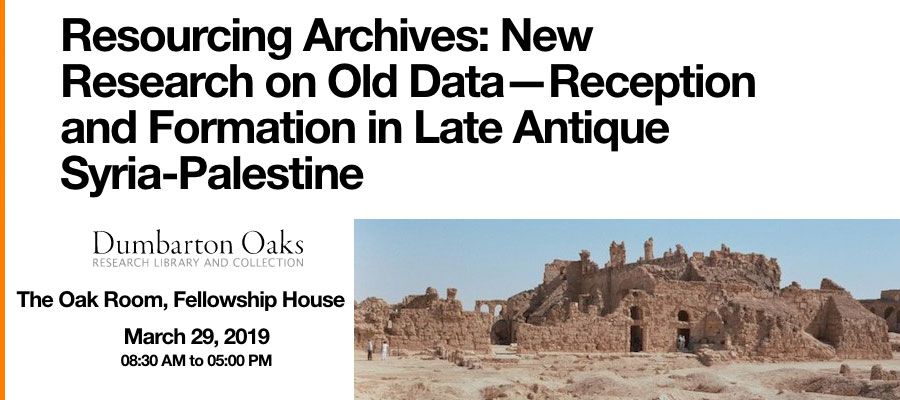Resourcing Archives: New Research on Old Data—Reception and Formation in Late Antique Syria-Palestine, Byzantine Studies Workshop, Dumbarton Oaks (The Oak Room, Fellowship House), March 29, 2019
Academic and national institutions are the holders of extensive inventories documenting cultural assets and historical landscapes. Recent global initiatives have invested efforts in the preservation of this body of material and raised awareness on the major significance of archives in understanding the past. The rise of the internet has facilitated the systematic display, searchability, and easy accessibility of archives—a process still in its infancy—while new geospatial and other digital technologies have provided a wealth of additional data points. Dumbarton Oaks has recently acquired a large collection of photographs that offer a comprehensive record of Syrian late antique heritage in the 1990s. This collection forms part of a global network of archival resources stored in a number of institutions in the US, Europe, and the Middle East that document the late antique Syria-Palestine. Collectively, these archives present invaluable scholarly evidence that has hardly been used in a systematic manner in Middle Eastern studies. This essential data should be incorporated with the evidence of field research conducted in more recent decades, as well as with data resulting from new technologies and systems of recording, to advance research in the face of the abrupt stop of fieldwork in Syria and the destruction of documentation.
The workshop will be divided into three sessions, each focusing on a distinct research theme, and demonstrating different modes of engaging archival and digital data. The first session (“Settings”) will lay down the broad metrics of the discussion, focusing on urban and regional settings. Specifically, participants will be asked to contemplate questions such as adaptive responses to social change as reflected in the urban landscape, and the interaction across urban and rural areas via networks of agricultural and pastoral societies. A crucial variable to engage is the question of time and diachronic processes. The second session (“Sites”) will deal with sites as case studies that combine fieldwork research with archival material. One of the goals of this session is to advance the interpretation of the archaeological record through close attention to indicators of late antique processes of reception and new development seen in the areas of architecture and the study of material remains. The third session (“Sacred landscapes”) will explore the making, and long histories, of sacred landscapes as seen in art and epigraphy, addressing questions such as the shifting social, economic, political, and cultural dimensions of religious sites and continuities and discontinuities in the production of material culture. The goal of the workshop is to further develop the current understanding of processes of transformation in late antique Syria-Palestine by focusing on the dynamic relation between reception and formation, which ties into contemporary research on adaptive and agile societies more generally.
